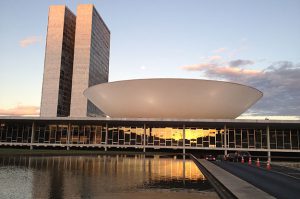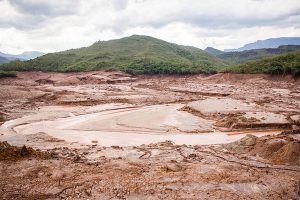
This Week in Brazil Podcast: Brazil’s ‘Que Se Vayan Todos’ Moment
Also available for download through the App Store and on all Apple devices. Is Brazil facing a “lost decade” from dual political and economic crises? AQ’s editor-in-chief Brian Winter answers this question in the latest episode of AQ’s new podcast, This Week in Brazil. After a reporting trip to Brazil this past week, Winter concluded that if there’s … Read more

Impeachment and Brazil’s ‘Que Se Vayan Todos’ Moment
Leia em Português When Argentina’s economy collapsed in late 2001, everybody was absolutely sure whose fault it was. Aloof, hermetic and increasingly prone to slurring his words in public, President Fernando de la Rúa had managed to trash the government’s fiscal accounts in just two years in power. Steakhouses and nightclubs were empty, unemployment was … Read more

This Week in Latin America: Brazil’s Government Breakup
Sign up here to get This Week in Latin America delivered to your inbox every Monday. PMDB Decision on Rousseff: It is considered “inevitable” that Brazil’s largest political party, the PMDB, will on Tuesday formally break with the government and support the impeachment of President Dilma Rousseff. One party leader tweeted “On Tuesday the 29th, the party will decide to … Read more

The Simple Anti-Zika Trick You Won’t See in Brazil
To combat the spread of the Zika virus, Brazil has zapped male mosquitoes with gamma rays, rolled out cyber mosquitos and smartphone apps, released genetically modified mosquitoes into the wild, and deployed nearly 250,000 troops to spray insecticides and add larvicides where mosquitoes lay eggs. Indeed, Brazilian authorities seem willing to do almost anything to curb Zika’s expansion. Just don’t ask them … Read more

The Endgame of Brazil’s Crisis: Four Things to Watch
After one of the most eventful 24 hour periods in Brazilian history, the crisis threatening President Dilma Rousseff appears to have entered its endgame. For those trying to handicap the odds of her impeachment, or simply struggling to make sense of it all, here are four things to watch in coming days: 1. The … Read more

Moody’s: Lula Appointment Could Spell End of Fiscal Adjustment in Brazil
Brazil’s political crisis is moving at such intense speed that it’s hard for even dedicated analysts to keep up. AQ’s editor-in-chief spoke on Tuesday with Moody’s ratings agency’s chief analyst for Brazil, Samar Maziad, about how the changes in Brasilia are affecting the economy. At the time, there were rumors that former President Luiz Inácio … Read more

The Key to Rousseff’s Future – And Maybe Brazil’s, Too
After more than a decade studying Brazil, there are still two things whose popularity I cannot fully explain: bacalhau and the PMDB. The former is a vile salted codfish that no human being should ever be forced to ingest. The latter is the Brazilian Democratic Movement Party, a shape-shifting, ideologically diverse group of politicians that … Read more

Don’t Let Brazil Become Venezuela
This piece was updated on March 7. The next week will be critical to the future of Brazilian democracy. The temporary detention of former President Luiz Inácio Lula da Silva for questioning related to the Petrobras probe is indeed a sign that no one in Brazil is above the law. But it also brings the … Read more

News Quiz: Did It Happen in Brazil or “House of Cards?”
A special thanks to Nexo, which first published this piece in Portuguese. “House of Cards” has inspired a political science class in Chile, the meme #CasadeNaipes in Argentina, and the parody “House of Narcs” in Mexico. But Netflix’s political series has hit a special nerve in Brazil. President Dilma Rousseff is fending off record-low popularity … Read more

The Brilliant Names of Brazil’s Anti-Corruption Operations: A Guide
This piece was updated on March 7. Operação Lava Jato, or “Operation Car Wash,” isn’t the only odd-sounding police sting to make waves in Brazil in recent years. Here are some of the names and stories behind the country’s most scintillating anti-corruption busts: Operação Lava JatoIn March 2014, a Brazilian currency exchanger named Alberto Youssef was caught … Read more

Brazil’s Historic Corruption Probe May Be at Risk
To date, President Dilma Rousseff has done a mostly admirable job of handling the historic corruption probe underway in Brazil. Even as the investigation of graft at state-run oil company Petrobras drew closer to her inner circle, and threatened to culminate in her impeachment, Rousseff allowed federal police and prosecutors to do their work with … Read more

This Week in Latin America: Brazil’s Environmental Disaster
Sign up here to get This Week in Latin America delivered straight to your inbox every Monday. Samarco Settlement: Nearly four months after a burst mining dam in Brazil killed 19 people and caused a wave of toxic sludge to pollute major water sources, mine owner Samarco Mineração S.A. is expected Monday to announce a financial settlement with the Brazilian government. Joint … Read more

Cassação, Impeachment and Brazil’s Dilma Rousseff: A Guide
Correction appended below Just when Brazil’s President Dilma Rousseff seemed to be clearing the threat of impeachment, another challenge to her presidency is gaining momentum. The arrest of one of Rousseff’s top political advisers on allegations he received $7.5 million in illicit funds has fueled speculation that the government could be toppled by cassação, or … Read more

Brazil Is Doing Its Part in the Global Fight Against Zika
On Monday February 1, the World Health Organization (WHO) declared the Zika virus, transmitted by the Aedes aegypti mosquito, an international public health emergency. The announcement follows the declaration by Brazil of a national public health emergency. An outbreak of the Zika virus was detected last year in Brazil. The virus has since been found … Read more

Sexual Harassment in Brazil Starts at Age Nine. Here’s What One Group Is Doing About It.
Nine years old. That’s the average age that, according to Brazilian NGO Think Olga, Brazilian females are first subjected to sexual harassment. Think Olga uncovered the startling number as part of a Twitter campaign called #primeiroassedio (#firstharassment), which encourages women to use social media to recount their first experience of sexual assault or harassment. To … Read more


